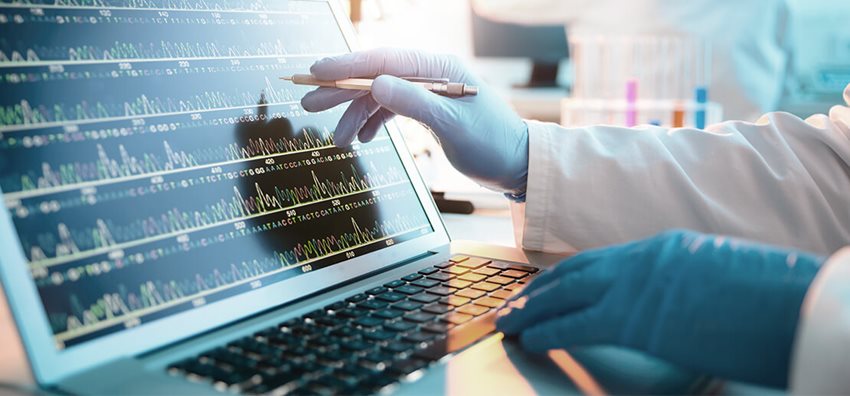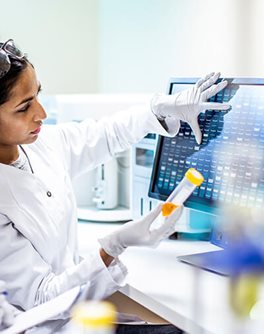
Though it’s been around in one form or another for many years, recent scientific advances have cast a spotlight on the current and future efficacy of personalized medicine. We may share anatomy and organic functionality, but our genetic codes, hereditary makeup, and the environments in which we live can all impact how our bodies respond to treatment. In short, one size does not fit all.
Diseases can occur in different genetic variants. Just as we all have different reactions or non-reactions to allergens, so do we respond differently to medical treatments. After many years of trying to treat diseases with one-size-fits-all treatments that were thought suitable for any given disease, we now know definitively that individual characteristics can affect our response to drug treatments. And so, we’ve opened up the study and practice of a revolutionary approach to precision medicine that can be customized on a personal level.
From Allergies to Cancer and Everything in Between
Some of the earliest practices of personalized medicine appeared in the treatments of allergies and asthma. AIT (Allergen Immunotherapy) treatments date back more than 100 years and was perhaps the first medical practice to take a truly customized approach to treatment. As far back 1911, allergists recognized that diagnosing patients in order to treat their very specific symptoms could be a much more effective way of alleviating the respiratory symptoms of a range of allergies, including hay fever and rhinitis.

For many years, allergists have prescribed NPPs (Named Patient Products) that are specifically prepared for a patient, based on the results of allergy testing. This particular practice has come a long way in the century since it was introduced. Today, AIT takes into account molecular diagnostics for achieving the highest possible precision.
1
The concept of personalized medication now goes far beyond allergy treatment. Precision medication methods identify phenotypes of patients with less-common responses to treatment or unique health care needs.
2

Sophisticated diagnostic tools inform clinicians of non-genomic and genomic determinants, which, when combined with patient symptoms, clinical history, and lifestyles, can allow for more precise and personalized diagnosis and prognostication. This has been especially critical in treating cancer patients and those suffering from a host of genetic and non-genetic hereditary diseases.
Active research in precision medicine is now converging with artificial intelligence to open up extraordinary therapeutic and diagnostic possibilities. These advances have spawned a new discipline known as Pharmacogenomics, which seeks to identify the variant genes affecting individual patient response to drugs. Pharmacogenomic analysis can identify disease susceptibility genes representing potential new drug targets. All of this will lead to novel approaches in drug discovery, an individualized application of drug therapy, and new insights into disease prevention.3
The synergy between personalized medicine and AI, and their impact on the healthcare system, aligns with the ultimate goal of prevention and early detection of diseases affecting the individual, which could ultimately decrease the disease burden for the public at large, and therefore, the cost of preventable healthcare for all.2
OHAUS Plays a Small, But Important Role

In order for scientists to continue researching and testing in the growing and evolving field of Pharmacogenomics, they require the right laboratory equipment. This is where OHAUS enters the picture.
Scientists rely on a range of precision laboratory instruments to help analyze samples. Among them are products OHAUS specializes in offering, like
centrifuges,
vortex mixers and
overhead stirrers.
In the realm of drug discovery, scientists rely heavily on overhead stirrers.
OHAUS Achiever™ 5000 Overhead Stirrers are designed for powerful, precise stirring, safety, and simplicity in all applications. The sealed design has an IP54 rating and ensures safe mixing performance even in the most demanding applications. The keyless chuck and software-controlled speed ramping provide easy setup and safe stirring to protect the sample and user. Select from five models with up to 200 Ncm torque and up to 100L volume capacity.
Achiever overhead stirrers can be customized for your application with more than 12 available accessories.
The
Frontier™ series of centrifuges are able to meet all sample separation needs, including PCR (Polymerase Chain Reaction) techniques in genotyping.
Multi centrifuges are used in clinical labs for blood separations. These different designs cover a range of sizes and each is adaptable with a
variety of rotors and available accessories to support a range of applications.
Frontier centrifuges are powerful, versatile, durable, reliable and designed for easy operation. The benchtop Micro model is ideal for high-speed lab applications.
For efficient sample mixing, OHAUS offers a range of
Vortex Mixers to suit a variety of applications, including re-suspending samples during molecular biology workflow. From the
Mini Vortex Mixer, to the
Heavy Duty,
Microplate and
Multi-Tube models, these mixers are powerful and able to accommodate challenging samples with enhanced vortex action and vigorous mixing.
To prepare buffers during molecular biology workflow, stirring is necessary.
OHAUS Guardian 5000™ Hotplates Stirrers are designed for safety and simplicity in laboratory applications. The design ensures proper mixing and temperature control of the top plate or your sample when using the optional temperature probe. Heating models include a Single Point Calibration feature for multiple setpoints. To protect the lab,
Guardian units feature SafetyHeat™, an early detection system that uses two independent safety controls to continuously monitor the electronics and shut off heating before an overtemperature condition occurs. Select from five models with three plate sizes for everyday heating and stirring applications.
Versatile
Dry Block Heaters are designed for everyday use with available accessories to suit a range of applications that require temperature stability. Choose from one, two, four, and six-block models with more than 40 accessories to meet your laboratory needs. Optional interchangeable blocks are easy to use with no tools required.
For more information about OHAUS Laboratory Equipment,
Contact Your Regional OHAUS Representative
2 “Precision Medicine, AI, and the Future of Personalized Healthcare,” Johnson, Kevin, et al, Vanderbilt University Medical Center
3 “Pharmacogenomics: The Promise of Personalized Medicine,” Mancinelli, Laviero, et al, University of California San Francisco Department of Biopharmaceutical Sciences, 3/7/2000